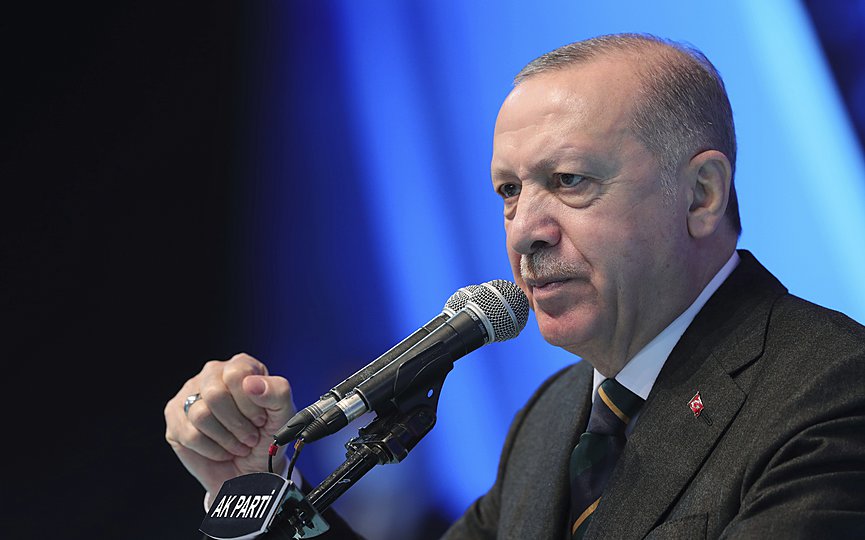General News
Meropi Kyriacou Honored as TNH Educator of the Year
NEW YORK – Meropi Kyriacou, the new Principal of The Cathedral School in Manhattan, was honored as The National Herald’s Educator of the Year.

ATHENS — The EU Recovery Fund was a very important, wise and unique step towards supporting the economic recovery in Europe and supporting particularly the economically weaker countries, Austria's former president Heinz Fischer said in an interview with the Athens-Macedonian News Agency (ANA) on Monday, ahead of his participation as a speaker at the Delphi Economic Forum, which will take place on May 10-15.
On the vaccination certificate, he said that a European framework for vaccination certificates is very urgent and necessary to make the international transport system and the freedom of trade and travelling function again.
The full interview follows:
The year 2021 marks the 200th anniversary of the outbreak of the Greek Revolution and Greece is celebrating its independence. As former president of Austria would you like to send a message to the Greek people?
The Greek revolution of 1821 and the following successful struggle for independence from the Ottoman Empire was the basis for the founding of the first Hellenic Republic.
From an Austrian perspective, this revolution was chronologically situated between the French Revolution of 1789 and the Austrian and Hungarian Revolution of 1848.
I have great understanding and sympathy for the Greek Revolution and as former President of Austria (2004-2016) and as a good friend of former Greek President Karolos Papoulias (2005-2015), it is an honor and a pleasure for me to send a message of congratulation to the Greek people – underlining the good and friendly relationship between Greece and Austria.
What would be the key challenges for the world and particular for the EU after Covid-19 and how can they be addressed? What is the importance of EU Recovery Fund. Αre the resources of the EU Recovery Fund sufficient?
The Covid-19 pandemic is a global mega-crisis and must not be underestimated. The policy of US President Donald Trump in this connection was absolutely irresponsible and the policy of President Bolsonaro from Brazil and some other countries still is.
By 5 April 2021, 2,850,521 people around the world have lost their lives due to the pandemic. The impact of Covid-19 on the world economy is enormous and its consequences will be felt for many years to come.
In this connection, the EU Recovery Fund was a very important, wise and unique step towards supporting the economic recovery in Europe and supporting particularly the economically weaker countries. It was – as we all know – not an easy decision and many difficulties had to be overcome until a common solution was agreed upon.
The European Commission, following a Greek initiative, is working rapidly to adopt a common European framework for vaccination certificates. Could this initiative be the solution to international transport after the pandemic?
A European framework for vaccination certificates in my opinion is very urgent and necessary to make the international transport system and the freedom of trade and travelling function again.
As far as I know, there are different ideas and proposals on the table. I’m not an expert enough to advocate for a particular proposal, but there is no doubt that we need a functioning solution as soon as possible and the deliberations from Athens are helpful to reach a common ground.
How do you see the future of European integration?
This is a good question: I’m born in 1938 and went to primary school when World War II ended. I was a student when the EEC was founded in 1957 (Treaty of Rome) and I was always an ardent supporter of the European integration.
I cannot describe the whole and positive development of the European integration, but when Austria joined the EU on January 1, 1995, together with Sweden and Finland, I was the speaker of the Austrian parliament and supported the YES in the referendum about Austrian membership as good as I could. I will never forget the strong support for Austria from the Greek government and in particular the Greek Foreign Minister Karolos Papoulias (later President) and after him Theodoros Pangalos.
Many years have passed since then and today we have two main problems. Problem number one: The post-World War II generation who had suffered immensely from war and extreme nationalism, was enthusiastic about the idea of European integration. However, this generation (and even the following generation) passed away in the meantime.
Nowadays, support for the European Union and European integration is not a matter of enthusiasm, but more a matter of different interests and national interests are not really helpful for solidarity.
Problem number two is the fact that the rule of unanimity was no major problem in a Union of 6, 9 or even 12 member states. But it is a large problem in a Unio with 27 members as we see every week and month in Brussels.
Today we need the European Union more than ever, but today decision-making in the European Union is more difficult than ever. This is a great problem for the future of the European Union and it reduces the optimism that the European Union can make great steps and reforms in the years to come.
The EU is discussing the new Migration and Asylum Pact. What do you think would be a comprehensive and effective migration management framework, with fair sharing of responsibilities and solidarity among member states of the EU? And how can the EU deal with a new instrumentalization of migration by Turkey?
I say three times yes to the necessity of an effective European migration management and to a fair sharing of burdens and responsibilities. And I regret that some European countries, including Austria, were not even ready to take a group of children out of the refugee camp Moria. I do not pretend to have a perfect solution in my pocket which is acceptable for all EU member states.
But I am convinced that the number of refugees and asylum seekers Europe can accept and distribute is higher than the number we accepted in the last 3 – 4 years. In particular if there is a fair distribution in Europe.
In my eyes, there are too many political parties and groups in Europe who do not want to help solving this problem, but rather keep the problem unsolved and use it for political agitation.
We need more solidarity and more readiness to share responsibilities in this field.
As far as the treaty with Turkey is concerned, I want to remind you about Winston Churchill’s judgment about democracy. It is not a good political system, but better than all other systems. In that sense I would say that the treaty with Turkey is not a good solution, but still better than other non-existing or non-functioning solutions.
Which would be an efficient and lasting EU deterrent policy against Turkish provocations and its illegal action both in the Eastern Mediterranean and Aegean?
It is a fact that Turkey – with its 83 million inhabitants – is a part of Europe. It is a member of the Council of Europe, a member of NATO and 50% of Turkish foreign trade is exchanged with the European Union. It is linked to the EU in many areas. Therefore, the relations between Turkey and the European Union are relevant for both sides.
20 years ago, negotiations and contacts between the EU and Turkey have been quite intensive: Not about full membership, but about a sort of association agreement. But the differences could not be bridged. In the meantime, the differences became even bigger, particularly in the last 5 or 6 years.
The politics of Erdogan, his misunderstanding of democracy, autocratic ruling, violating human rights, military interventions in neighboring countries etc. make it impossible to build up trust. This would have been eventually possible with Abdullah Gül some years ago, but obviously not with Erdogan. It is true that in the last few months the voice of Erdogan became softer vis-à-vis the European Union. But this is not so much the consequence of a new thinking and new basic values, but more the consequence of the deterioration of the economic situation in Turkey, of higher inflation, lower real income and many other problems.
And it was just a few days ago that the President of the European Council Mr. Michel and the President of the European Commission Ms. Von der Leyen visited Ankara and President Erdogan demonstrated very clearly that he is not willing or not able (or both) to bridge the gap between his policy and European values. A few days earlier he cancelled Turkey’s membership to the Istanbul Convention aiming at fighting violence against women.
And there is no guarantee that the next parliamentary election in Turkey will be fair and free elections if some of his main opponents are sitting in prison because they are his opponents.
What do you expect from the new Biden presidency? What are the prospects for rebuilding the EU-US relationship under the Biden administration? Do you see an opportunity for a new start and in which areas?
Frankly speaking I was afraid that Donald Trump could win the US presidential elections in November 2020 for a second term.
And I was very happy and relieved that Joe Biden was elected in the end.
This means that a decent, reliable and democratic representative of US interests with good relations to Europe is in the White House.
But this does not mean that US interests will not remain number one priority in US politics.
Let me touch upon some areas: I think that rule of law and democracy will be in better hands than they were in the last 4 years.
I also think that moral standards (as for instance saying the truth) in the White House will be higher than before.
I believe that the interest on good relations with Europe – as I mentioned already – will be one of Joe Biden’s priorities.
What – on the other hand – will not change is the fact that we live in a multipolar world and that the United States are the number one military power in the world, while China could reach number one position in world economy in around a decade. Therefore, competition between the US and China, between the strongest military power and the (soon) strongest economic power, will continue and become even harder.
The maintenance of peace will therefore remain one of the most sensitive tasks in international relations.
But there is a good chance that global cooperation in other sensitive areas like climate protection, the fight against pandemics, disarmament, trade agreements, the role of the United Nations etc. will be in better hands in Washington in the coming years than they have been in the last 4 years.
Is this too optimistic?
I think you cannot make politics without optimism.
NEW YORK – Meropi Kyriacou, the new Principal of The Cathedral School in Manhattan, was honored as The National Herald’s Educator of the Year.

NEW YORK – The New York Greek Independence Parade on Fifth Avenue, commemorating the 203rd anniversary of the Greek Revolution of 1821, was held in an atmosphere of emotion and pride on April 14.
NEW YORK — Whitey Herzog, the gruff and ingenious Hall of Fame manager who guided the St.
ST. LOUIS — Strong storms caused damage in parts of the middle U.
ATHENS, Greece — The world is not doing enough to protect coral reefs, the United Nations’ special envoy for the ocean said Tuesday in defense of the marine ecosystems that protect biodiversity, sustain underwater life and produce some of the oxygen we breathe.
NEW YORK – With the calls of “Long live March 25th,” “Long live Greece,” and “Long live Cyprus,” this year's pre-parade grand celebratory reception at the Pierre Hotel was held on April 14.